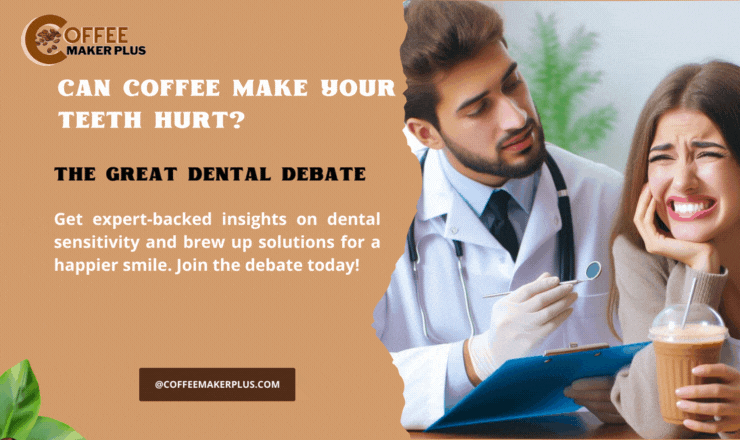
There’s a certain satisfaction in that first sip of your morning joe—its warmth, rich aroma, and inviting flavor marking the start of your day. However, for many coffee enthusiasts, that familiar pang of discomfort that follows can be more than just a brisk awakening; it’s a reminder that not all is well with our teeth. Coffee, beloved for its myriad effects, from increased alertness to possible health benefits, is also being studied for its less desirable connection to dental pain. With teeth being as critical to us as the caffeine-infused elixir itself, it raises an important question for all coffee drinkers: Can coffee make your teeth hurt? Delve into this complex relationship as we explore how our daily pick-me-up might not be picking up our oral health.
The short answer to “Can Coffe Make Your Teeth Hurt?” is Yes, it can. But why does this happen?
The main culprit behind tooth pain caused by coffee is caffeine. Caffeine is a natural stimulant found not only in coffee beans but also in tea leaves, cocoa beans, and other plants. Caffeine works by blocking the effects of adenosine, a neurotransmitter
Table of Contents
Can Coffee Make Your Teeth Hurt: Understanding Tooth Sensitivity
Tooth sensitivity is a common dental problem characterized by a sudden, sharp pain in one or more teeth when encountering certain substances and temperatures. This discomfort is the result of the tooth’s protective layers being worn down over time, exposing nerve endings to external stimuli. Causes range from aggressive brushing and acidic foods to dental conditions like cavities and gum diseases.
The Link Between Coffee and Tooth Sensitivity
Coffee’s inherent acidity can erode tooth enamel, making it more susceptible to sensitivity. Additionally, the temperature of hot coffee can cause quick contractions and expansions in the teeth, exposing those sensitive nerves and leading to brief but intense pain.
The Acidity of Coffee: A Dissolving Dilemma
Coffee is naturally acidic, a trait that can weaken enamel and encourage tooth decay. The delicate process of demineralization – the loss of minerals from the tooth’s surface – can lead to permanent damage, creating pathways for sensitivity and pain.
Hot Drinks: A Temperature-Sensitive Trigger
The hot temperatures at which coffee is typically served can cause substantial, though temporary, changes in tooth structure. This thermal shock can provoke pain in sensitive teeth as the nerves become more reactive to stimuli.
Additional Aggravating Factors
Factors such as prolonged exposure – as when sipping coffee slowly over hours – and additives like sugar used in beverage preparation can compound the negative impact of coffee on dental health.
Managing Dental Sensitivity: Tips for Sensitive Sipper
Sensitive teeth don’t have to mean the end of your coffee break. By incorporating a few strategic options, coffee lovers can still enjoy their brew with minimal discomfort.
Improved Oral Hygiene Habits
Regular brushing with a soft-bristled toothbrush, flossing, and using a toothpaste designed for sensitive teeth can help maintain dental health and minimize further enamel loss.
Protect Your Smile
Consider using a straw to drink coffee, which can help bypass the teeth and limit direct exposure to enamel-damaging elements. Alternatively, you can enjoy your coffee with a calcium-rich meal to help counteract the acid’s effects.
See Your Dentist Regularly
Dental professionals can provide tailored advice and treatments, from applying fluoride varnishes to crafting custom mouthguards for night-time use to prevent grinding, a potential source of enamel wear.
Alternate with Less-Aggressive Options
For days when sensitivity is prominent, opting for a decaffeinated, less-acidic coffee or even herbal tea can be a soothing alternative.
Other Factors to Consider: The Big Picture of Dental Health
While coffee consumption plays a role in dental sensitivity, its impact cannot be viewed in isolation. Oral health is the sum of various factors, including genetics, overall diet, and lifestyle habits. Balanced nutrition, adequate hydration, and regular exercise can contribute to stronger teeth and support the body’s natural defenses against sensitivity and other dental issues.
The Role of Genetics in Dental Sensitivity
Genetics can predispose individuals to thinner enamel or misaligned teeth, which increases susceptibility to tooth sensitivity. Understanding and accepting these genetics as part of your dental health profile can guide more tailored protective efforts.
Lifestyle Habits and Sensitivity
Lifestyle choices like smoking, excessive alcohol consumption, and poor dental hygiene practices can further erode enamel and compound sensitivity. Addressing these habits can significantly improve dental health and reduce sensitivity.
Coffee’s Complicated Health Profile
Though coffee’s acidity can harm dental health, it also boasts various health benefits—from enhancing focus and alertness to providing antioxidants that combat systemic inflammation. Balanced consumption and protective measures can allow coffee lovers to savor their cup of Joe without undue concern.
Final Thoughts
Dental sensitivity can indeed be a painful side effect for coffee enthusiasts. While the acidity and temperature of coffee can play a role in this discomfort, proactive dental care, thoughtful consumption, and attention to overall health can restore harmony between the love of coffee and your smile.
For those navigating the delicate balance of savoring their cherished coffee without the sting of pain, moderation, protection, and professional guidance can be the key to keeping your pearly whites pearly and your love for coffee undiminished. Remember, a mindful and informed approach to your dental health ensures that the morning cuppa stays a welcome and comforting tradition rather than a wince-inducing ordeal.